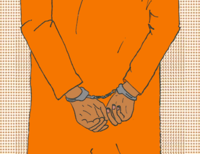2016’s Criminal Justice Victories
2016 was a year of big victories for the Prison Policy Initiative. Read about some of the biggest wins in our campaigns this year.
by Kim Cerullo, December 23, 2016
2016 was a year of big victories for the Prison Policy Initiative. Our campaigns took some big steps forward and, in some cases, those victories culminated in major policy changes.
Here are some of the biggest wins in our campaigns this year:
- A federal Judge declared prison gerrymandering in rural Jefferson County, Florida to be an unconstitutional violation of the principle of “one person one vote.” Our staff were expert witnesses in the case.
- In April, Tennessee passed legislation to allow rural counties to avoid prison gerrymandering.
- We organized 100,000 people to submit comments to the Census Bureau demanding an end to prison gerrymandering. This movement was also supported by a letter from 13 U.S. Senators. We are awaiting a decision from the Census Bureau about where incarcerated people will be counted in the 2020 Census.
- Common sense prevailed in Massachusetts this year. Armed with our Suspending Common Sense report, our friends at EPOCA led a campaign that resulted in the elimination of a law which automatically suspended the driver’s licenses of people convicted of drug offenses wholly unrelated to driving. This law, a relic of the War on Drugs, made it harder for people with drug convictions to fulfill family, economic, and court obligations.
- Encouraged by this victory, we are expanding our campaign beyond Massachusetts. This month we released our new report Reinstating Common Sense: How driver’s license suspensions for drug offenses unrelated to driving are falling out of favor. This report exposes the 12 states and Washington, D.C. which still suspend licenses for drug offenses unrelated to driving and is already winning major editorial board support.
- We followed up on our previous report on postcard-only mail policies in jails this year with Protecting Written Family Communication in Jails, A 50-State Survey.
- Supported by our reports, the movement to end letter bans grew this year. Sheriffs in Macomb County, Michigan and Flagler County, Florida agreed to lift postcard-only policies, and lawsuits are underway to challenge postcard-only policies in Knox County, Tennessee and Wilson County, Kansas.
We also published a record number of ground-breaking reports to push the national conversation about mass incarceration and over-criminalization. Our most notable reports include:
- Correctional Control: Incarceration and supervision by state
Prison is just one piece of the correctional pie, and we often overlook the leading type of correctional control: probation. This report is the first of its kind and aggregates data on all of the types of correctional control: federal prisons, state prisons, local jails, juvenile incarceration, civil commitment, Indian Country jails, parole, and probation. - States of Incarceration: The Global Context 2016
Our report and infographic directly situate individual U.S. states in the global context. This updated version reveals that the use of incarceration in every state – even those with relatively progressive policies – is out of step with the international community. - Detaining the Poor: How money bail perpetuates an endless cycle of poverty and jail time
Detaining people because they are poor is an offensive idea, but until this year it was difficult to prove that this is exactly what the American system of cash bail does. This report uses an obscure and underutilized government dataset to show that the typical bail amount in the U.S. is equivalent to eight months of income for the typical defendant. Our report not only proved the obvious, but we helped reframe the debate to show why modest changes in bail amounts won’t be enough to reverse the tremendous rise in the population of people detained before trial. - Punishing Poverty: The high cost of probation fees in Massachusetts
In Massachusetts, probation is a much bigger part of the correctional control pie than incarceration. Our new report reveals that being on probation comes at a price: probation service fees in the state cost probationers more than $20 million every year, a cost that largely falls on those who are too poor to pay.



